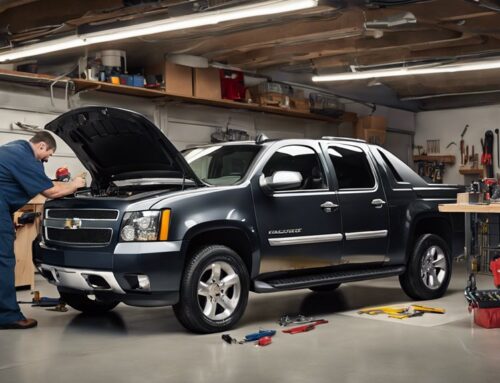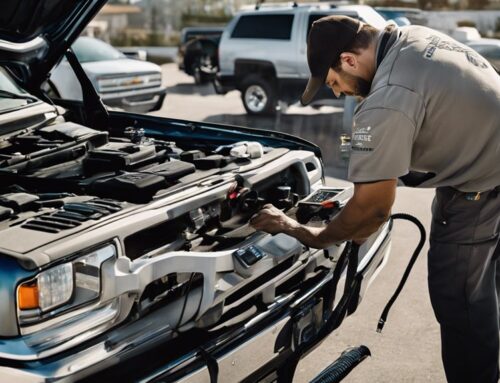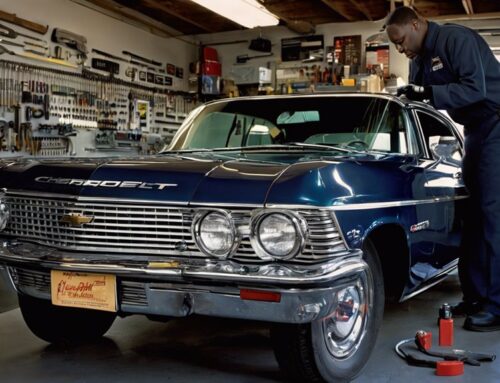If your car key won’t turn in the ignition, start by checking for any obstructions in the keyhole and clean it using compressed air. Confirm the steering wheel isn’t locked by gently jiggling it while turning the key. Lubricate the key and ignition with graphite-based lubricant for smoother operation. Validate that the gear selector is in Park or Neutral. Testing with a spare key can also provide a quick solution. If these steps don’t work, professional assistance may be required to address more complex issues. For further guidance, additional troubleshooting tips are readily available.
Introduction
Encountering a car key that won’t turn in the ignition can be both frustrating and disruptive to your daily routine. Promptly addressing this issue is important not only for getting back on the road but also for preventing potential damage to your vehicle’s ignition system. This article will provide a detailed guide on identifying common causes and implementing simple solutions to make sure your key turns smoothly and reliably.
Brief overview of the issue: car key not turning in the ignition
When a car key refuses to turn in the ignition, it often signals underlying issues with the key itself, the ignition lock cylinder, or related components such as the steering wheel or gear selector. This frustrating scenario can arise from a bent or worn key, obstructions within the ignition lock cylinder, or even complications with the power steering system affecting the ignition switch. Diagnosing the exact root cause is crucial for effective troubleshooting. Simple yet effective solutions include jiggling the steering wheel, verifying the gear selector’s position, or ensuring the battery is operational. Addressing this issue promptly prevents further damage to the ignition system and ensures the vehicle can start smoothly, maintaining the reliability of your car.
Importance of addressing the problem promptly
Promptly addressing a car key that won’t turn in the ignition is crucial to avoid potential complications such as being stranded, incurring costly repairs, or compromising vehicle safety and reliability. Ignoring this issue can lead to more severe problems, including damage to the ignition system itself, which may necessitate expensive repairs or even complete replacement of key components. Taking immediate action guarantees your vehicle remains dependable and safe, preventing situations where you are left unable to start your car. Seeking professional assistance early can save both time and money, allowing for a quicker resolution and mitigating further risks. Addressing the problem promptly highlights the importance of maintaining your vehicle’s operational integrity and overall peace of mind.
Overview of the post’s contents and purpose
Exploring that your car key won’t turn in the ignition can be a frustrating and inconvenient experience, but this guide is here to provide you with practical solutions and insights to address and resolve the issue effectively. In this detailed post, you will learn simple solutions to tackle a stubborn car key, understand the primary reasons behind ignition key malfunctions, and explore detailed troubleshooting steps. Additionally, we will investigate common issues related to the key, ignition cylinder, and other related components, offering you practical tips to fix a stuck key. By the end of this guide, you will be equipped with the knowledge to handle this common automotive problem with confidence and ease.
Common Reasons Why a Car Key Won’t Turn in the Ignition
Understanding why a car key won’t turn in the ignition involves recognizing several common issues. These can range from the wear and tear of the key and ignition, to dirt and debris obstructing the ignition cylinder, to the engagement of the steering wheel lock mechanism. Additionally, problems with the car’s battery or the vehicle not being in the correct gear can also contribute to this frustrating situation.
Overview of typical causes
A variety of factors can prevent a car key from turning in the ignition, ranging from mechanical issues like a steering wheel lock to electrical problems such as a dead battery. One common culprit is the steering wheel lock, a theft deterrent mechanism that can inadvertently engage. Misalignment or wear on the key itself may also hinder its ability to align properly within the ignition. Additionally, obstructions or debris inside the ignition lock cylinder can cause difficulty. Ensuring the gear selector is in Park or Neutral is important, as improper positioning can prevent the key from turning. Lastly, issues within the electrical system, particularly a dead battery, can inhibit the ignition system, making the key unresponsive.
Wear and tear of the key and ignition
The wear and tear of both the car key and the ignition cylinder are predominant factors contributing to the key’s inability to turn smoothly, often necessitating a thorough examination and timely maintenance to guarantee seamless operation. Over time, keys may become worn or damaged, leading to misalignment issues or an inability to engage internal components effectively. This can manifest as bent or broken keys, complicating the turning process. Similarly, ignition cylinders can deteriorate, causing internal mechanisms to malfunction and the key to get stuck or fail to turn. Addressing these issues promptly through key or cylinder replacement, and regular lubrication can ensure that your ignition system operates flawlessly, preserving the longevity and reliability of your vehicle.
Dirt and debris in the ignition
Accumulated debris within the ignition system can greatly impede the smooth operation of your car key, leading to frustrating and potentially costly delays. Dirt and debris can infiltrate the ignition cylinder, creating friction that hinders the key’s ability to turn smoothly. This obstruction can prevent the key from properly engaging with the ignition components, making it difficult, if not impossible, to start your vehicle. To address this issue, consider using compressed air or a specialized cleaner to remove dirt and debris from the ignition cylinder. Regular maintenance and cleaning are essential to keep the ignition system free from buildup, ensuring your car key turns effortlessly. By keeping your ignition clean, you can avoid unexpected delays and maintain your vehicle’s reliability.
Issues with the steering wheel lock
One prevalent reason why a car key won’t turn in the ignition is the improper disengagement of the steering wheel lock, a common safety feature designed to prevent vehicle theft. When the steering wheel lock applies pressure on the ignition switch, it can hinder the key from turning. To address this, gently turn the steering wheel slightly left and right while simultaneously attempting to turn the key. This maneuver can help alleviate the pressure and allow the key to turn smoothly. Ensuring the steering wheel is not locked in place before attempting ignition is essential. Understanding this mechanism not only resolves immediate issues but also empowers you to troubleshoot future key turning problems effectively and confidently.
Problems with the car battery
A malfunctioning car battery can be a major culprit behind ignition key issues, often leading to an unresponsive key that refuses to turn. When the battery is dead or low, the electrical system struggles, affecting the ignition switch’s functionality. This can be particularly frustrating, especially when accompanied by a locked steering wheel that applies additional pressure, hindering the key’s movement. Making sure your battery is in good health is essential. Additionally, always verify that the transmission gear selector is in Park or Neutral, as this can also influence the key’s responsiveness. Addressing any electrical issues related to the battery promptly can save you from further complications and ensure a smooth ignition experience.
Preliminary Checks Before Attempting Repairs
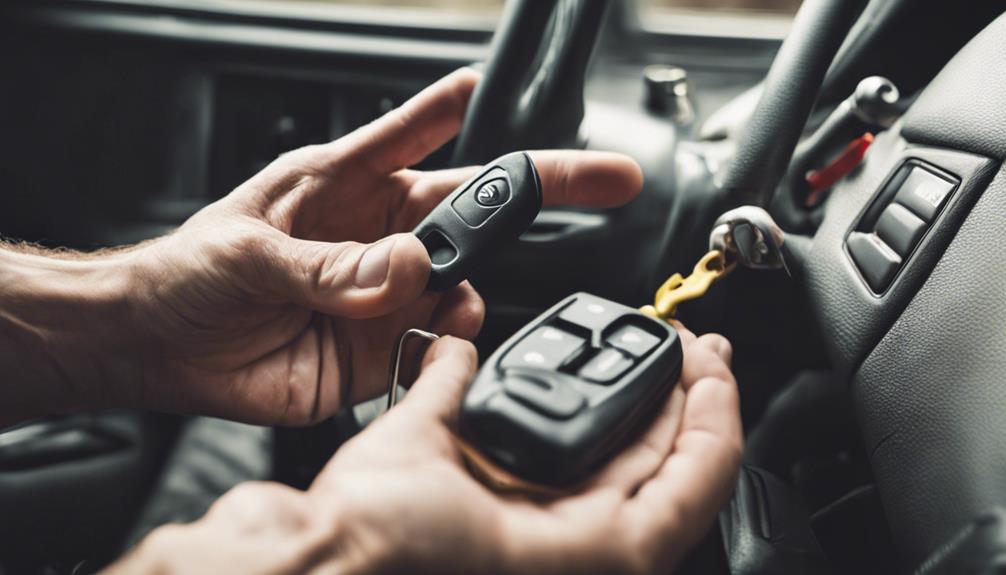
Before attempting any repairs, it’s essential to perform some preliminary checks to identify the root cause of the issue. Start by confirming the vehicle is in park or neutral and the steering wheel is not locked, as both can prevent the key from turning. Additionally, inspect the key for damage, verify it is fully inserted, and test the battery to make sure it has sufficient power to engage the ignition system.
Ensuring the car is in park or neutral
Ensuring the car is securely in park or neutral is a critical initial step to diagnose and resolve issues with a key that won’t turn. Begin by confirming that the vehicle’s shift lever indicator shows it is in park or neutral. This simple yet essential check can often be the key to accessing your ignition, as the transmission gear selector plays a pivotal role in the ignition system’s functionality. Verify the car is snugly parked and the gear setting is accurate to prevent complications with the key turning. This fundamental yet often overlooked step can be the difference between a quick fix and a prolonged issue, setting the stage for successful troubleshooting and resolution.
Checking the steering wheel lock mechanism
When faced with a car key that won’t turn, it is important to first check whether the steering wheel lock mechanism is engaged, as this can often be the culprit behind ignition issues. To do this, gently turn the steering wheel left and right while simultaneously attempting to turn the key. A locked steering wheel places undue pressure on the ignition switch, making it difficult for the key to turn. If you find the steering wheel locked, releasing it should allow the key to move freely in the ignition. This simple but vital step can often resolve the issue without further intervention, emphasizing the importance of preliminary checks before delving into more complex repairs.
Inspecting the key for visible damage or wear
How often do we overlook the simple yet essential task of inspecting our car keys for visible damage or wear when faced with ignition issues? Begin by checking for signs of bending, warping, or other visible damage that may prevent the key from turning. Examine the key’s edges and teeth for wear and tear that might affect its engagement with the ignition cylinder. Also, look for dirt, grime, or grease buildup that could interfere with smooth operation. Make sure you are using the correct key for your vehicle, as using the wrong one can cause similar problems. If the key appears worn or damaged, consider having a professional locksmith create a new one to resolve the issue.
Verifying the car battery’s condition
Before delving into complex repairs, it is crucial to verify the car battery’s condition, as a weak or dead battery can be a primary culprit behind ignition issues. Begin by checking the battery’s voltage with a multimeter to confirm it meets the necessary level for starting the vehicle. Make sure the battery connections are clean and secure to avoid any power delivery problems. Inspect the terminals for any signs of corrosion, as this can impede the electrical flow required for ignition. If the battery is faulty, it will not provide adequate power for the ignition system to function properly. Addressing these potential battery issues can save you time and effort, preventing unnecessary and more complicated repairs.
Basic Troubleshooting Steps
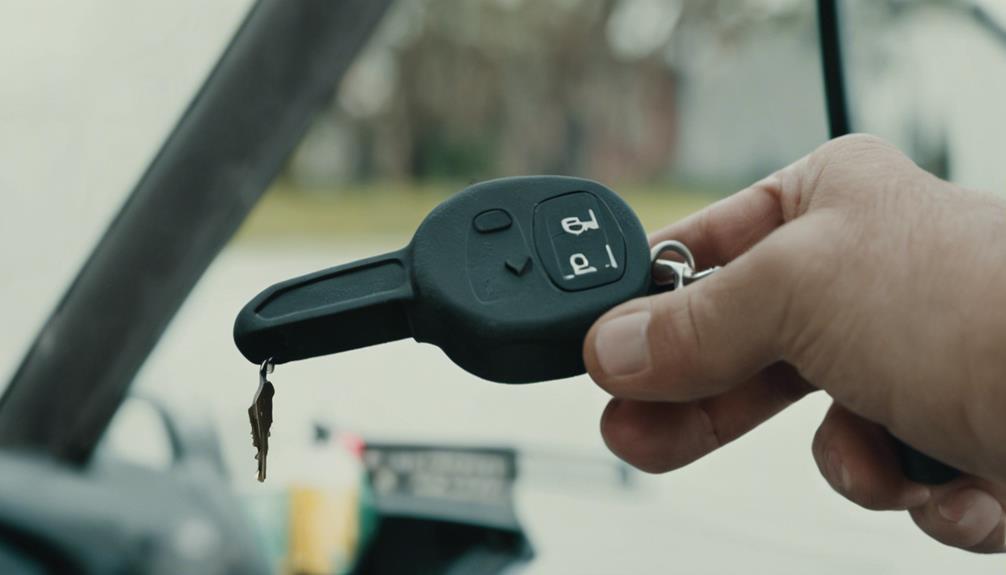
To effectively address a car key that won’t turn, start by using a different key to determine if the issue lies with the original key itself. Next, consider lubricating the ignition with a graphite-based lubricant to ease any friction within the cylinder. Additionally, cleaning both the key and ignition, and adjusting the steering wheel can further guarantee a smooth operation of the ignition system.
Using a different key
Switching to a different key can swiftly identify whether the original key is the root cause of the ignition problem, providing a straightforward and effective troubleshooting step. Often, keys experience wear and tear over time, which can affect their ability to align properly with the ignition cylinder. By using a spare key, you can quickly determine if the issue lies with the original key’s wear or damage. This simple test can reveal whether the spare key turns smoothly, suggesting that the original key is indeed faulty. This method is not only quick but also cost-effective, allowing you to pinpoint the problem without unnecessary complications. Remember, sometimes the simplest solution is the most effective one.
Lubricating the ignition
Lubricating the ignition cylinder is a fundamental yet highly effective step in resolving issues where a car key refuses to turn, ensuring smooth operation and extending the lifespan of the lock mechanism. Utilizing graphite powder or silicone spray can greatly reduce friction, allowing the key to glide effortlessly. Graphite powder is especially favored due to its long-lasting lubrication properties that do not attract dirt or debris, making it ideal for maintaining a clean ignition cylinder. Alternatively, silicone spray is another excellent option known for its ability to extend the life of both the key and lock mechanism. Routine lubrication not only resolves immediate key turning issues but also serves as a preventative measure against future sticking or jamming, ensuring reliable vehicle performance.
Cleaning the key and ignition
Ensuring the cleanliness of both the key and ignition is an essential initial step in addressing and preventing issues related to a car key that won’t turn. Begin by using a soft cloth or alcohol wipes to meticulously clean the key, removing any dirt or grime that might impede its function. Inspect the key for signs of wear, damage, or bending. For the ignition cylinder, employ compressed air or a small brush to clear out any debris obstructing the key’s movement. This attention to detail can make a significant difference. Regular maintenance, including routine cleaning of both the key and ignition, not only resolves current issues but also prevents future problems, ensuring smooth operation and extending the life of your vehicle’s ignition system.
Adjusting the steering wheel
Adjusting the steering wheel is a fundamental troubleshooting step that can often resolve the issue of a car key that won’t turn, as it helps to alleviate any undue pressure on the ignition lock. Ensuring that the steering wheel is not locked in place is essential, as a locked position can prevent the key from turning. To release any tension, gently wiggle the steering wheel back and forth while attempting to turn the key. This movement can align the internal components of the ignition system, facilitating smooth key insertion and turning. Proper positioning of the steering wheel is important, as it affects the alignment of the key in the ignition cylinder, thereby ensuring seamless operation and preventing future issues.
Advanced Fixes and Solutions
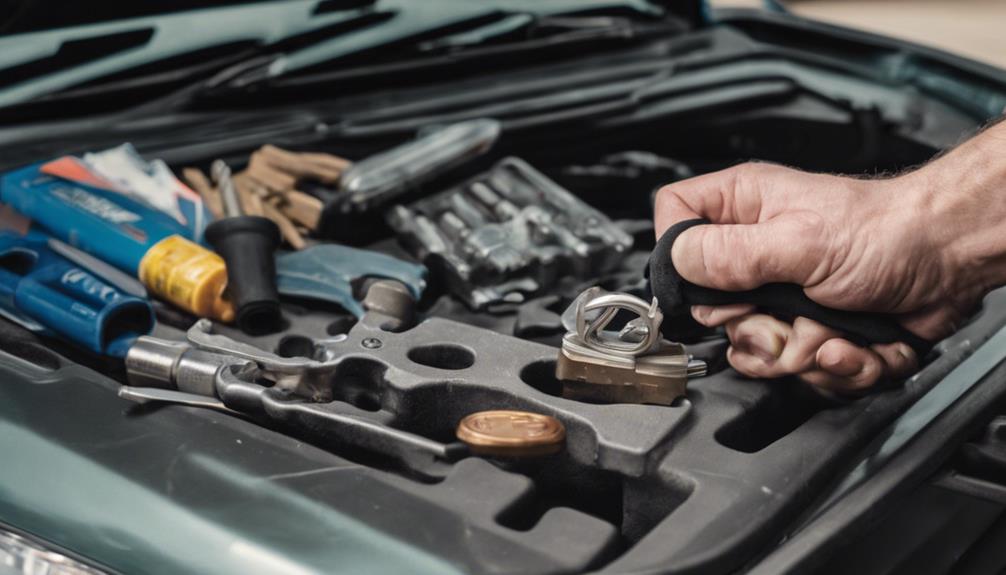
In addressing more complex issues, advanced fixes such as realigning the ignition cylinder and replacing a worn-out key are important steps. Additionally, professional ignition switch cleaning and complete replacement may be necessary for resolving persistent key turning problems. Engaging a trusted professional can guarantee these intricate repairs are handled safely and effectively.
Realigning the ignition cylinder
To achieve peak key operation, realigning the ignition cylinder involves meticulously adjusting the internal components to restore smooth functionality. Misalignment in the ignition cylinder can result in the key not turning smoothly or even getting stuck, a frustrating experience for any car owner. Professional locksmiths or mechanics possess the expertise and specialized tools necessary to realign the ignition cylinder with precision. Key internal components such as springs and pins must be correctly positioned, ensuring that the key can turn without resistance or issue. This delicate calibration process is essential for best performance and can greatly extend the life of your ignition system, providing a seamless driving experience and restoring your confidence in your vehicle’s reliability.
Replacing a worn-out key
Verifying a worn-out key is a critical step in resolving ignition issues, as a new key can restore the precise alignment necessary for smooth and reliable operation. A worn or damaged key often leads to misalignment, preventing the ignition from turning. To rectify this, first confirm that the replacement key matches your vehicle model exactly. Using a non-metal hammer on a wooden surface, you can gently straighten a bent key, improving its alignment. Swiftly addressing key wear prevents further damage to the ignition lock cylinder, ensuring long-term functionality. Embrace the simplicity and effectiveness of a new key to breathe new life into your ignition system, avoiding unnecessary complications and maintaining your vehicle’s reliability.
Professional ignition switch cleaning
Addressing more complex ignition issues often requires professional ignition switch cleaning, a meticulous process that can restore peak functionality by eliminating accumulated dirt, debris, and grime obstructing key movement. Specialized tools and cleaning solutions are employed to thoroughly cleanse the ignition switch components, ensuring peak performance. A professional locksmith or mechanic will meticulously disassemble the ignition system to inspect and identify any underlying issues. This detailed inspection is essential in preventing future key-related problems. Moreover, cleaning often involves lubricating the necessary components to reduce friction and enhance key turning. Engaging a professional not only guarantees a thorough job but also prolongs the life of your ignition system, providing you with smooth and reliable operation.
Replacing the ignition switch
Undertaking the task of replacing an ignition switch can be a complex but rewarding endeavor, demanding precision, patience, and adherence to specific procedural steps to guarantee successful completion. Begin by disconnecting the battery and airbag to guarantee safety. Utilizing a steering wheel puller, carefully access the ignition switch. Adhering to the repair manual is essential for specific instructions pertinent to your vehicle model. Costs vary: older vehicles might see a $250 expenditure, while newer models with electronic lock cylinders could incur higher costs. Testing the ignition post-installation is important to verify smooth key operation. For best results, consulting a professional mechanic or preferred shop is highly recommended, ensuring proper installation and alleviating potential complications.
When to Call a Professional Locksmith

Recognizing when to call a professional locksmith can save you time and prevent further damage to your vehicle’s ignition system. Certified locksmiths offer a range of specialized services, including key extraction, ignition cylinder replacement, and key programming, making them invaluable for complex key and ignition issues. Additionally, companies like Low Rate Locksmith provide 24/7 emergency assistance, ensuring you’re never stranded due to a stubborn car key.
Signs that indicate a need for professional help
When your car key refuses to turn despite thorough troubleshooting, it is crucial to recognize the signs that warrant the expertise of a professional locksmith. Persistent issues such as a completely stuck key, repeated failed attempts to turn the key, or visible damage to the key or ignition cylinder are clear indicators that professional help is needed. Professional locksmiths possess the specialized skills and tools required to diagnose and resolve complex ignition and key problems efficiently. Additionally, attempting DIY fixes on advanced ignition systems can lead to further damage. To guarantee a proper and lasting solution, promptly contact a reputable locksmith when encountering persistent key turning problems. This approach ensures safety and preserves the integrity of your vehicle’s ignition system.
Benefits of hiring a certified locksmith
Engaging the expertise of a certified locksmith offers numerous advantages, ensuring that your car key and ignition issues are resolved with precision and efficiency. These professionals undergo rigorous training, equipping them to diagnose and address a wide range of lock and key problems accurately. With specialized tools and equipment, certified locksmiths can tackle even the most complex ignition issues. Their solutions are not only reliable but also secure, safeguarding your vehicle against potential risks. By hiring a professional, you save considerable time and effort, bypassing the frustrations of trial-and-error fixes. Ultimately, the expertise of a certified locksmith brings peace of mind, knowing that your car’s security and functionality are in expert hands.
Services offered by Low Rate Locksmith for ignition issues
Low Rate Locksmith offers thorough and expert services for ignition key issues, guaranteeing that problems such as a key not turning in the ignition are resolved efficiently and effectively. Specializing in diagnosing and fixing ignition cylinders and key mechanisms, their locksmiths bring a wealth of experience to every job. Whether the problem lies in a worn-out ignition cylinder or a malfunctioning key, Low Rate Locksmith’s reliable, efficient, and cost-effective solutions guarantee your vehicle is back in working order swiftly. Their dedicated professionals provide the necessary expertise and prompt assistance, making them the go-to choice for any ignition-related difficulties. Trust Low Rate Locksmith to deliver intimate, tailored service that meets your specific needs and restores your peace of mind.
Preventative Measures to Avoid Future Problems
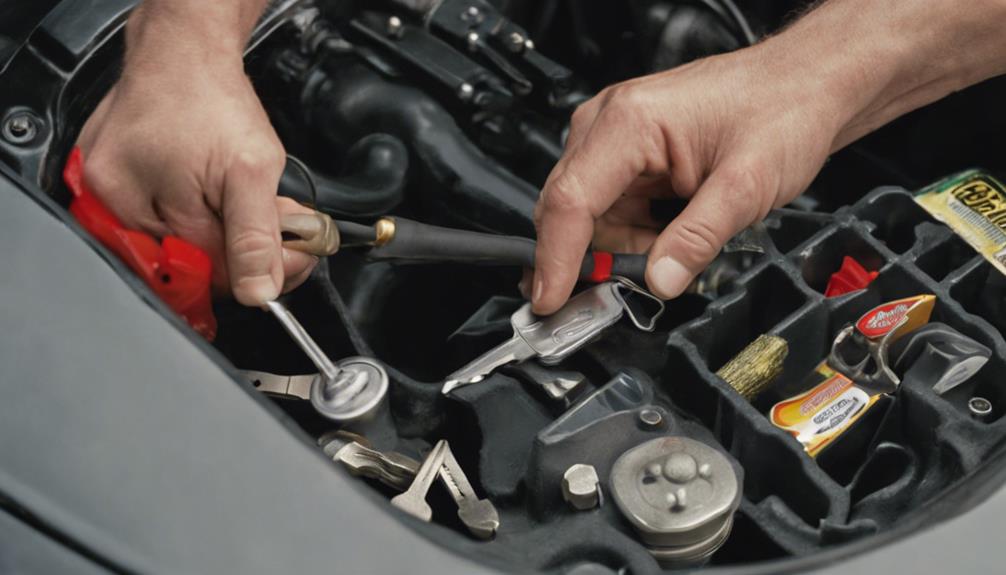
To prevent future issues with your car key and ignition, it is crucial to adopt regular maintenance practices such as cleaning the key and inspecting it for damage. Additionally, employing safe driving habits can greatly reduce wear and tear on the ignition system. Proper cleaning techniques for the ignition, combined with prompt attention to any emerging problems, will guarantee your vehicle remains reliable and hassle-free.
Regular maintenance tips for car keys and ignition
Regular maintenance of your car keys and ignition system is essential for preventing future issues and ensuring the longevity of your vehicle’s operation. Regularly clean and lubricate both the key and the ignition cylinder to prevent debris buildup, which can cause friction and hinder smooth operation. Inspect your key for signs of wear and damage; replacing a worn key can avert potential ignition problems. Additionally, periodically check the alignment of the steering wheel lock and gear selector, as misalignment can lead to key turning issues. Maintaining proper battery health and electrical system functioning is vital, especially in high-end vehicles. Address any ignition lock cylinder issues promptly to prevent complications down the road. Consistent care ensures a reliable and seamless driving experience.
Safe driving practices to minimize wear and tear
Maintaining the longevity and peak performance of your vehicle’s ignition system also involves adopting safe driving practices that minimize unnecessary wear and tear. Avoid turning the key with excessive force, as this can lead to damage in the ignition components. Regularly clean and inspect your key for dirt or damage, as even small particles can affect functionality. Handle your key gently to prevent bending or warping. Additionally, park your vehicle on level surfaces to reduce stress on the ignition mechanism. Adhering to your vehicle’s maintenance schedule ensures all components, including the ignition, remain in top condition. By incorporating these practices, you can greatly extend the life and reliability of your car’s ignition system.
Proper cleaning techniques for the ignition system
Maintaining a clean ignition system is crucial for preventing future issues and guaranteeing the smooth operation of your vehicle. Regularly clean your key with a soft cloth and mild detergent to eliminate dirt buildup. Use compressed air to blow out any debris or dust trapped in the key cylinder, ensuring the internal components remain unobstructed. Avoid harsh chemicals or excessive lubricants, as they can attract more dirt and grime, leading to complications. Periodically inspect the key cylinder for signs of wear or damage, addressing any issues promptly to prevent escalation. Scheduling routine maintenance checks not only guarantees the ignition system remains clean but also enhances its overall functionality, providing peace of mind and a smoother driving experience.
Related Services by Low Rate Locksmith

Low Rate Locksmith offers extensive automotive locksmith services, ensuring you have access to expert solutions for issues such as key duplication and replacement, and key fob programming and replacement. In addition to emergency lockout services, they also specialize in ignition repair and replacement, providing reliable and efficient assistance whenever you need it. Their team is dedicated to resolving your car key problems with precision and professionalism.
Overview of automotive locksmith services
When faced with car key issues, the all-encompassing automotive locksmith services provided by Low Rate Locksmith stand ready to address a wide range of problems with unmatched reliability and efficiency. Offering services such as key extraction, ignition repair, key fob replacement, and rekeying, they are well-equipped to handle diverse automotive needs. Available 24/7, their emergency locksmith services guarantee that help is always just a call away, no matter the hour. With trained technicians specializing in various car key and ignition problems, Low Rate Locksmith ensures cost-effective and prompt solutions. Their expertise and dedication to quality service make them an invaluable asset for resolving car key issues swiftly and effectively, providing peace of mind to every customer.
Key duplication and replacement
For those in need of reliable key duplication and replacement services, Low Rate Locksmith offers a wide range of solutions that cater to both traditional and modern car keys with exceptional precision and efficiency. Utilizing advanced equipment and technologies, the company guarantees that every key, whether a simple traditional one or a sophisticated smart key, is duplicated or replaced accurately. Their services are not only quick and efficient but also affordable, making them a trusted choice for many. Whether you have lost your car key or simply need a spare, Low Rate Locksmith stands ready to assist with utmost reliability. Clients can expect a seamless experience, characterized by professional care and attention to detail, ensuring peace of mind.
Key fob programming and replacement
Beyond key duplication and replacement, Low Rate Locksmith extends its expertise to the specialized arena of key fob programming and replacement, ensuring that vehicle owners maintain seamless access to their car’s advanced security and convenience features. Their skilled technicians are adept at programming and syncing key fobs for a myriad of vehicle makes and models, offering swift solutions for lost, damaged, or malfunctioning key fobs. With competitive rates and a focus on efficiency, Low Rate Locksmith empowers you to regain control over your vehicle’s functionality effortlessly. Trust in their all-encompassing services to restore the full spectrum of your car’s capabilities, from remote start to keyless entry, enhancing both security and convenience with expert precision.
Emergency lockout services
In the domain of automotive emergencies, Low Rate Locksmith’s 24/7 emergency lockout services stand as a beacon of reliability and swift resolution for car key issues such as a key that won’t turn in the ignition. Highly trained locksmith technicians are always on standby, ready to provide immediate, on-the-spot solutions. Their expertise guarantees that whether the problem lies with the key itself or the ignition cylinder, your car will be back on the road in no time. With a steadfast focus on customer satisfaction, Low Rate Locksmith promises prompt and professional assistance, alleviating the stress of unexpected lockouts. When faced with car key troubles, their commitment to excellence and efficiency makes them a trusted ally.
Ignition repair and replacement services
Drawing on their extensive expertise in emergency lockout services, Low Rate Locksmith also excels in providing thorough ignition repair and replacement services to address car key issues effectively. Specializing in resolving situations where car keys won’t turn in the ignition, their team leverages years of experience to deliver efficient and reliable solutions. From diagnosing intricate ignition problems to recommending cost-effective repairs or replacements, Low Rate Locksmith guarantees that every customer receives tailored, high-quality service. Clients have come to trust Low Rate Locksmith not just for their technical prowess but also for their commitment to providing dependable and prompt assistance. When ignition troubles arise, Low Rate Locksmith stands ready to restore your vehicle’s functionality with precision and care.
Conclusion
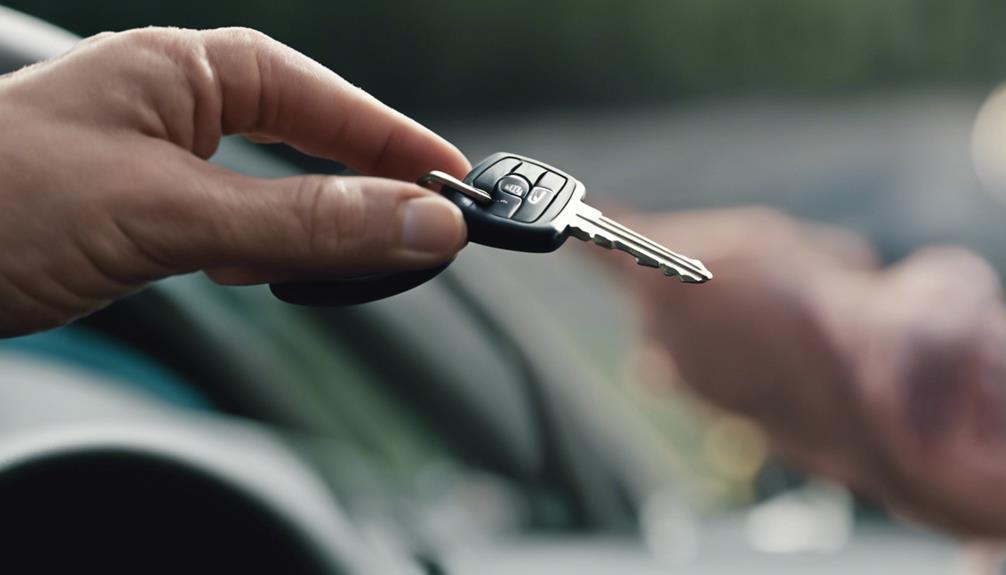
To sum up, dealing with a car key that won’t turn requires understanding the root causes, implementing simple fixes, and maintaining key and ignition components. Promptly resolving these issues guarantees your vehicle’s reliability and safety. For expert assistance, Low Rate Locksmith is ready to provide professional services to keep you on the road without hassle.
Recap of key points discussed
To conclude, addressing a car key that won’t turn involves several practical steps, including jiggling the steering wheel, making sure the gear selector is correctly positioned, checking the battery status, inspecting and potentially replacing the key, and cleaning the ignition lock cylinder. Each of these steps plays an essential role in diagnosing and resolving common ignition issues. By gently moving the steering wheel, you can relieve pressure on the lock mechanism. Ensuring the gear selector is in Park or Neutral can rectify alignment problems. Checking the battery status helps rule out power issues. Replacing a worn or bent key ensures proper fit, while cleaning the ignition lock cylinder removes obstructions. These solutions collectively offer a holistic approach to restoring your car’s ignition functionality.
Encouragement to address ignition issues promptly
Neglecting ignition issues can quickly escalate from a minor inconvenience to a significant problem, potentially leaving you stranded and facing exorbitant repair costs. Prompt attention to key problems is vital to prevent further damage to the ignition system. Ignoring a key that won’t turn can lead to more complicated and expensive repairs, undermining the safety and reliability of your vehicle. Immediate action not only spares you from inconvenience but also mitigates potential safety hazards while driving. By addressing ignition issues promptly, you guarantee your vehicle remains dependable, safeguarding both your peace of mind and your wallet. Stay proactive and attentive to maintain the smooth operation of your car.
Contact information and call-to-action for Low Rate Locksmith services
When faced with ignition key issues, consider reaching out to Low Rate Locksmith for expert assistance and swift resolution. Their experienced team specializes in handling cases where your car key won’t turn in the ignition, providing reliable and prompt solutions to get you back on the road quickly. Low Rate Locksmith understands the urgency of such situations and offers emergency services to address your needs efficiently. Trust their professional expertise to resolve your car key troubles with precision and care. For a quick and effective resolution, contact Low Rate Locksmith today. Visit their website or call their dedicated hotline to experience their exceptional service and guarantee your car key issues are handled expertly and promptly.
Frequently Asked Questions
Can Extreme Weather Conditions Affect My Car Key Turning in the Ignition?
Absolutely, extreme weather conditions can greatly impact your car key’s ability to turn in the ignition. Cold weather can cause the key to stiffen, while high temperatures may lead to belt glazing, which affects overall vehicle performance. Regular maintenance, such as using temperature-rated belts and conducting routine inspections, is essential. Protecting your key and belts from extreme temperatures can prevent premature wear, ensuring smooth operation and reliability of your vehicle.
Will Using a Spare Key Help if the Primary Key Won’t Turn?
Will using a spare key help if the primary key won’t turn? Absolutely. Imagine discovering the simple solution that lies within your grasp. Utilizing a spare key can swiftly determine whether the problem stems from the original key or the ignition cylinder. This method is not only cost-effective but also a practical diagnostic tool, revealing if the primary key requires replacement or repair. Keep that spare key handy; it might save the day.
Can a Worn-Out Key Cause Ignition Problems?
Absolutely, a worn-out key can indeed cause ignition problems. Over time, keys tend to wear down, leading to misalignment with the ignition lock cylinder’s internal components. This wear and tear results in damaged or rounded edges, preventing proper engagement with the lock mechanism. Consequently, a worn-out key may fail to activate the tumblers fully, causing the key not to turn. Regular maintenance and inspection of keys can mitigate these issues.
Are There Any Specific Car Models More Prone to Ignition Key Issues?
Imagine a garden where certain plants are more susceptible to pests. Similarly, specific car models like the Chevrolet Silverado 1500, Ford Escape, Honda Accord, Nissan Altima, and Toyota Camry are particularly prone to ignition key issues. Intriguingly, recurring troubles are also reported in models such as the Ford Explorer, F-150, Honda Civic, CR-V, and Toyota Corolla. These vehicles commonly face challenges, making understanding and addressing this issue essential for owners.
How Can I Tell if the Ignition Cylinder Itself Is Faulty?
To determine if the ignition cylinder is faulty, observe for wear and tear, difficulty inserting the key, or unusual sounds like grinding. Test with a spare key; if the problem persists, it likely indicates a cylinder issue. Inspect for any physical obstructions inside the ignition. If the key works in other locks but not the ignition, it strongly suggests a malfunctioning cylinder requiring attention.

